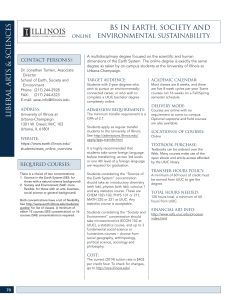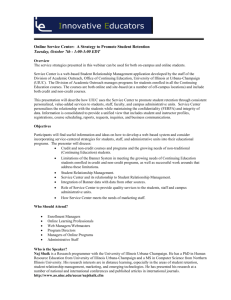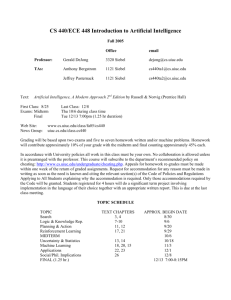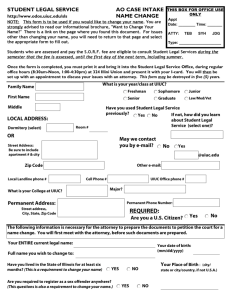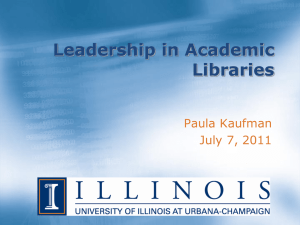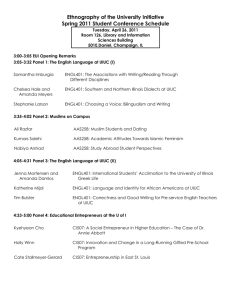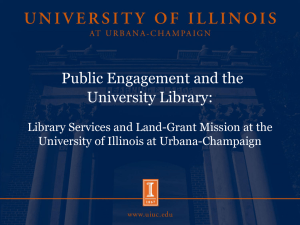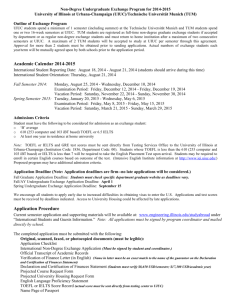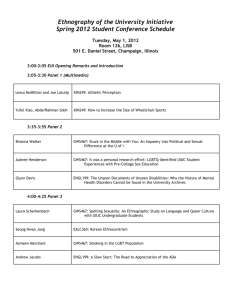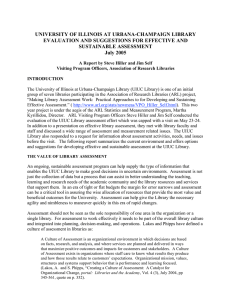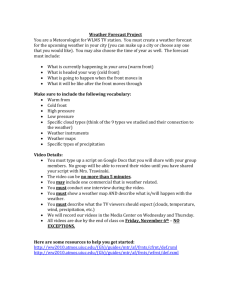Pamela_Greer_ResearchProcess - Ideals
advertisement
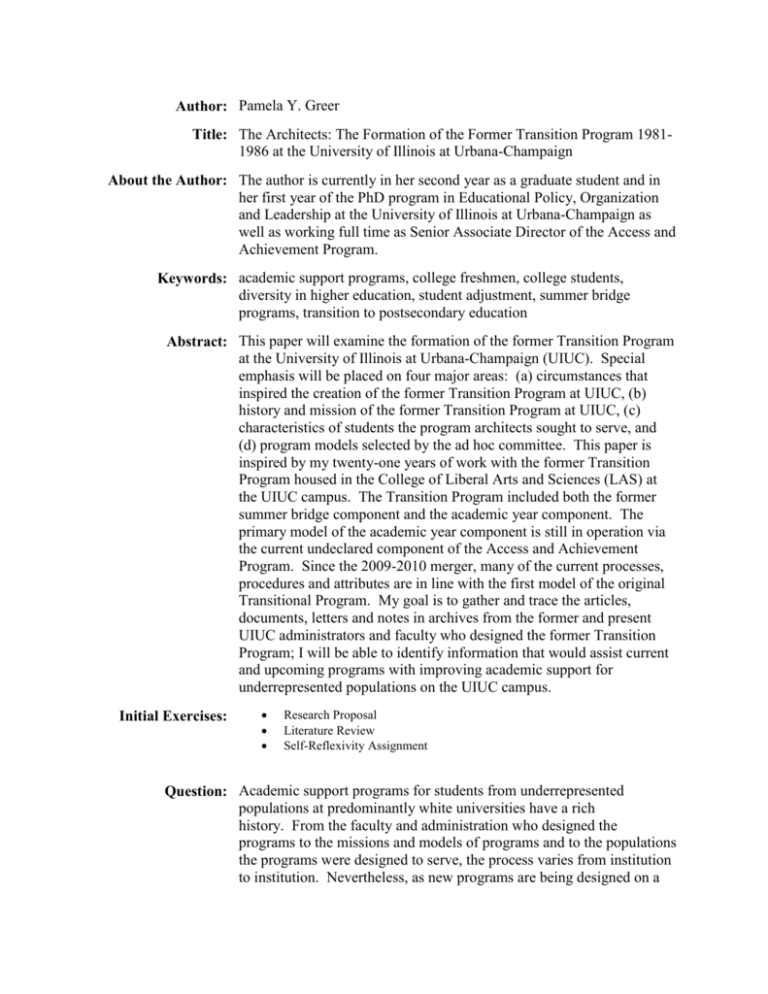
Author: Pamela Y. Greer Title: The Architects: The Formation of the Former Transition Program 19811986 at the University of Illinois at Urbana-Champaign About the Author: The author is currently in her second year as a graduate student and in her first year of the PhD program in Educational Policy, Organization and Leadership at the University of Illinois at Urbana-Champaign as well as working full time as Senior Associate Director of the Access and Achievement Program. Keywords: academic support programs, college freshmen, college students, diversity in higher education, student adjustment, summer bridge programs, transition to postsecondary education Abstract: This paper will examine the formation of the former Transition Program at the University of Illinois at Urbana-Champaign (UIUC). Special emphasis will be placed on four major areas: (a) circumstances that inspired the creation of the former Transition Program at UIUC, (b) history and mission of the former Transition Program at UIUC, (c) characteristics of students the program architects sought to serve, and (d) program models selected by the ad hoc committee. This paper is inspired by my twenty-one years of work with the former Transition Program housed in the College of Liberal Arts and Sciences (LAS) at the UIUC campus. The Transition Program included both the former summer bridge component and the academic year component. The primary model of the academic year component is still in operation via the current undeclared component of the Access and Achievement Program. Since the 2009-2010 merger, many of the current processes, procedures and attributes are in line with the first model of the original Transitional Program. My goal is to gather and trace the articles, documents, letters and notes in archives from the former and present UIUC administrators and faculty who designed the former Transition Program; I will be able to identify information that would assist current and upcoming programs with improving academic support for underrepresented populations on the UIUC campus. Initial Exercises: Research Proposal Literature Review Self-Reflexivity Assignment Question: Academic support programs for students from underrepresented populations at predominantly white universities have a rich history. From the faculty and administration who designed the programs to the missions and models of programs and to the populations the programs were designed to serve, the process varies from institution to institution. Nevertheless, as new programs are being designed on a number of campuses, including the University of Illinois at UrbanaChampaign (UIUC), I believe historical memory is significant. If we begin to acknowledge and learn the historical memory of these programs, we can reduce repetitious mistakes, waste less funds, waste less time and increase the academic success of the students the programs are designed to serve. The program I have interest in is the former Transition Program that was housed in the College of Liberal Arts and Sciences (LAS) on the UIUC campus. The following four questions will be addressed: (a) what were the circumstances that inspired the creation of the former Transition Program at UIUC? (b) What is the history and mission of the former Transition Program at UIUC? (c) What are the characteristics of students the program architects sought to serve? (d) Also, what program models were reviewed and selected by the ad hoc committee? Plan: In order to understand the formation of the former Transition Program, I decided to meet the challenge by reflecting on the documented facts. As a result, I gathered and reviewed some of the papers of former administrators at UIUC. This search allowed me to trace the development of the program from 1981 to 1986. By searching through campus and personal archives, I gathered documents from the following faculty and administrators including but not limited to: Professor James D. Anderson, Professor Richard Barksdale, Associate Dean Robert M. Copeland, Chancellor John E. Cribbet, Dr. Larry Mann, Director Bruce D. Nesbitt, Professor Maria Keen, Mr. Charles Sanders, Mr. Hugh M. Satterlee, Mr. Robert K. Todd and reports from a number of ad hoc committees. Data: Please refer to Appendices in the paper. Discuss: One of the road blocks I encountered was, that I did not find certain papers I sought in the actual archive library. Remaining objective and staying on topic after reading the papers was a challenge. Whether finding items in President Ikenberry’s files or not finding certain meetings in Chancellor Cribbet’s appointment book, it was interesting trying to fill in the missing pieces to the story. Since this is an area that I have a passion for, I believe I did find many relevant documents and articles for the final paper. However, there is still so much more material to sift and sort. I do believe examining the program more closely via interviews with students and staff, observations and more written documents would be an interesting task to tackle. The literature is fairly saturated with examples of programs and models. However, little data are provided to evaluate and substantiate the success of the students (Garcia and Paz, 2009, pp. 30-31). In the future, I look forward to finding more statistics. However, for this specific project, I enjoyed examining the care and research the Ad Hoc Committees appeared to exhibit as they tackled the tasks set before them by Chancellor Cribbet. The uncovered results of the architects of TP, laid the foundation for creating a successful program. Successful meaning that this program developed a twenty-year record of preparing talented students in intercollegiate athletics, dance, and writing with different backgrounds for the academic rigors of the University of Illinois at Urbana-Champaign. These results lined up with the original mission and design of the program (Mann et al., 1982, p. 25). EUI References/Tagging: Reflect: As a student in EOL 574, throughout the entire process, working on this project was eye-opening. Initially, I knew that I wanted to select a topic/project that stemmed from my work experience with the former Transition Program. However, that is all that I knew. For the first four to six weeks, I struggled with deciding if I would interview people, dig through archives or write a self-ethnography. I wrestled with focusing on the students, zeroing in on the administrators or actually featuring the program. Eventually, I realized that all of it would be a challenge. However, I knew that I had a strong interest in historical memory of the UIUC and how it has led to contemporary policies and procedures. That is why the Ethnography of the University Initiative (EUI) is a perfect fit for me. As a result, I chose to explore the archives and focus on the formation of the former Transition Program. I agree with my classmate/colleague Holly Herrera. "Having my first experience with research archived is" amazing. I believe this is the stepping stone to becoming a genuine researcher. Recommendations: Before the University takes on new initiatives and projects, I believe it should invest some time seeking historical memory. Some initiatives may actually set a president, but many of the ideas or recycled. As a result, I believe many errors can be avoided and a greater opportunity to move forward quicker can occur due to respecting the historical memory of documents and individuals who have done the work. Also, in this type of work like Academic Support Programs, Ad Hoc committees appear to be more productive and thorough when it consists of both young/seasoned faculty and actual laypersons who have the practical experience.
